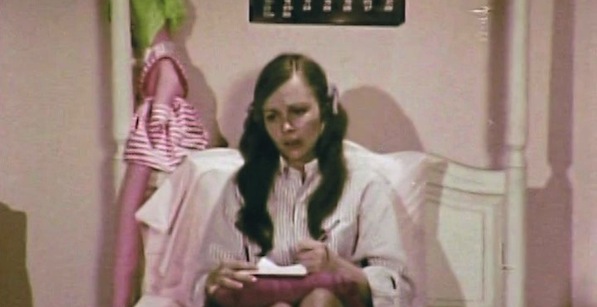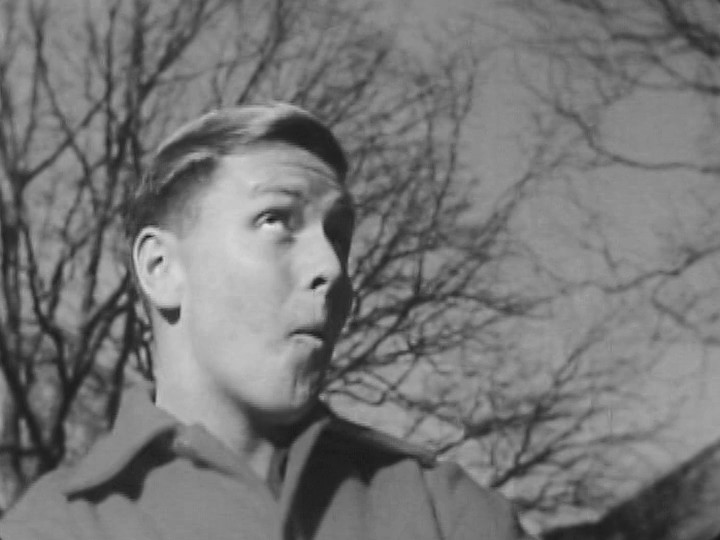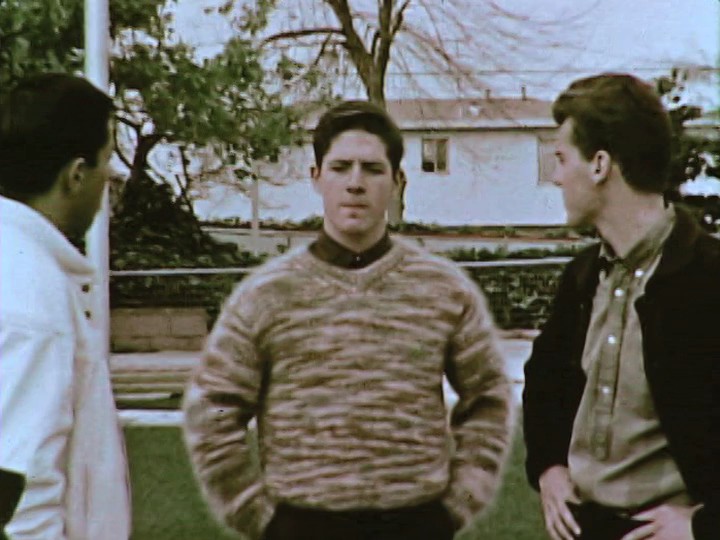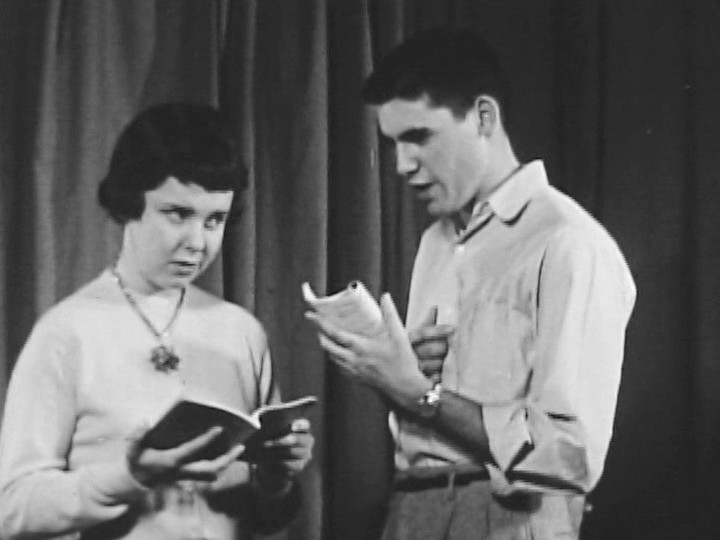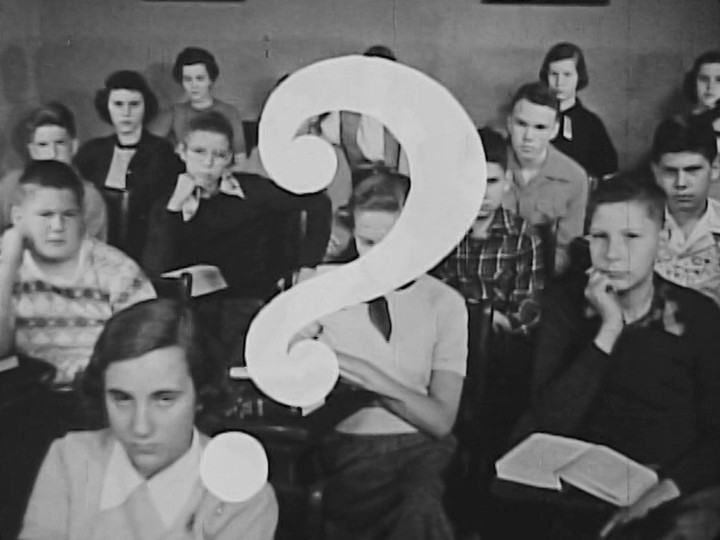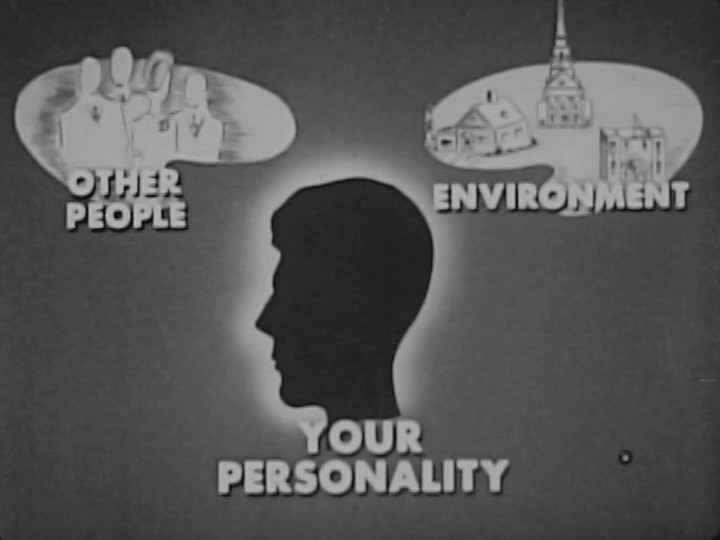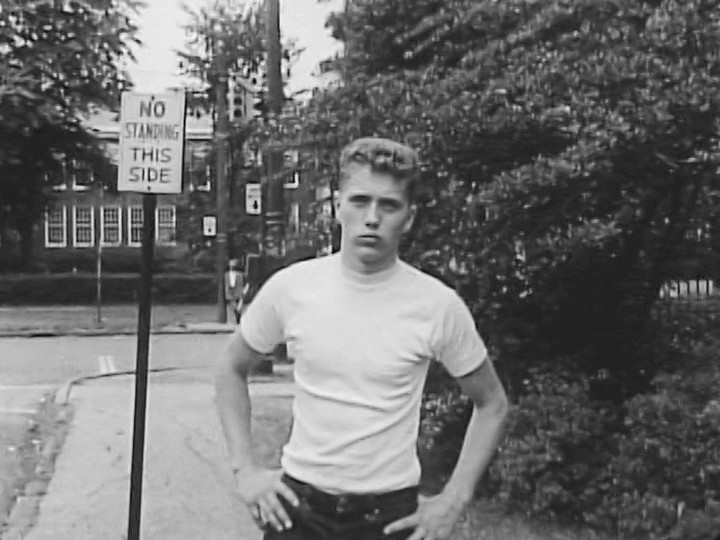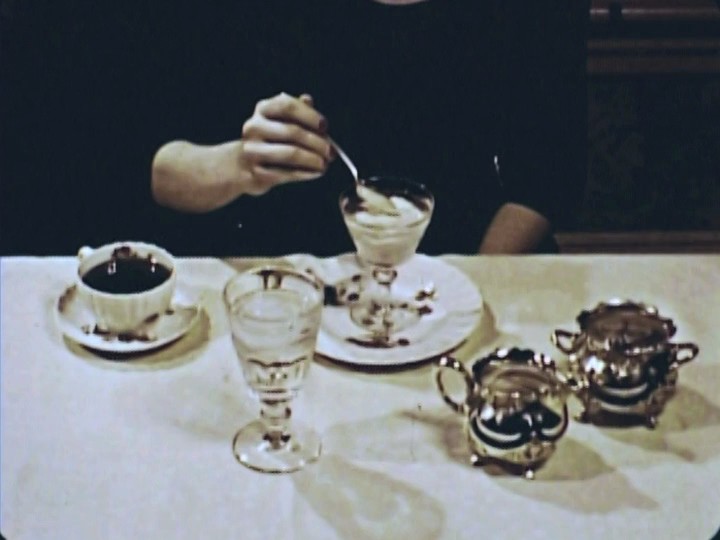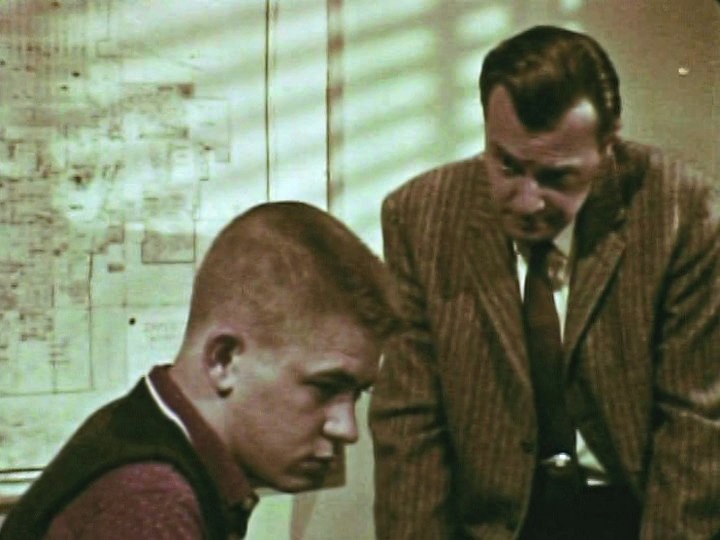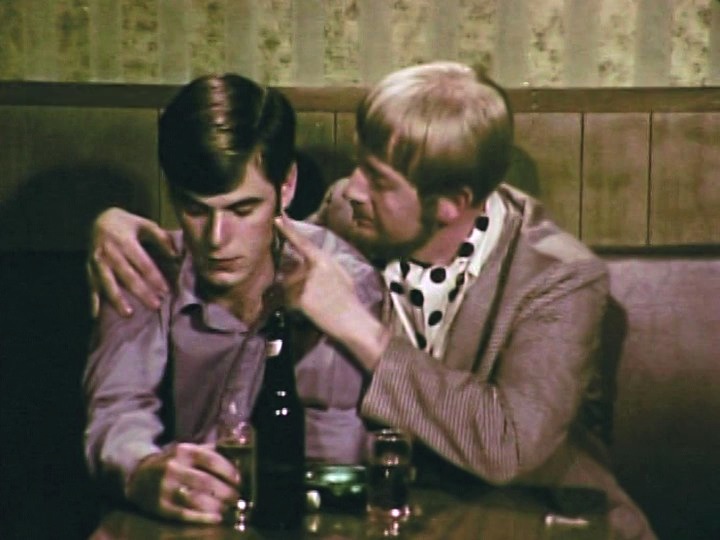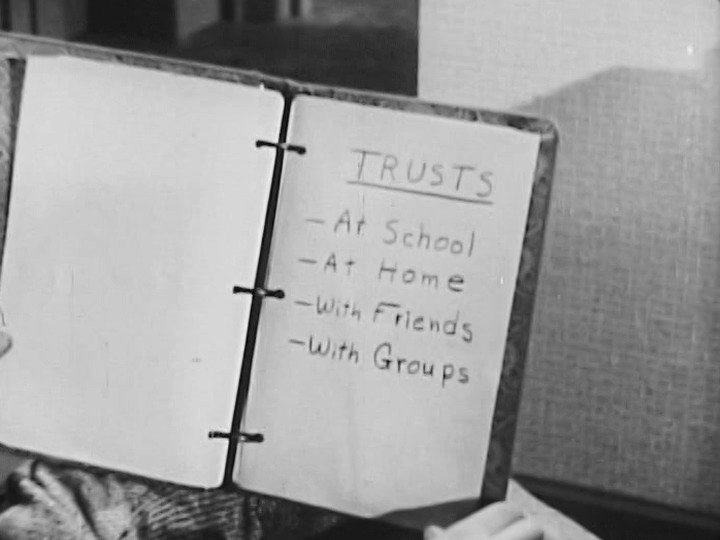At the age of eleven, I was obsessed with the word “immature.” It was something we were obligated to be and yet incapable of detecting. I had no idea what “maturity” was, or how I was to be it. Like “personality” or “trustworthiness” it was a quality others seemed to act out naturally and as I couldn’t, I mustn’t be. Herein lies the power of the Educational Film: it makes obvious the ephemeral; it demonstrates for us the things we miss because we can’t see ourselves in motion, it depersonalizes the emotional conundrum—it’s us in the neutral, not the ideal, and it says “we’re all born good, let us help you be decent, too.”
America is a nation seduced by youth. Forget how impossible it might be to define “maturity,” that indescribable quality that separates men from boys. Words are scary in the face of old-fashioned acting-out, and since what we’re looking for is a process of judgment, an orientation that bridges the personal and the interpersonal, doesn’t it make sense the word “maturity” is undervalued? Sure, Act Your Age is literally about a teen that gets bitchy over a test and carves his initials into a desk—any foreign film fan sees the kid’s self-esteem took a nosedive and he acted out—but the way he turns to etching that failure into wood is almost an anthem for angry America. The principal’s punishment elicits change in the student; there is no detention, the kid designs his own rehabilitation by listing his behaviors. The lesson suggests, you are your own master, your own punisher, and your own reward. This is liberty and the cost is youth.
Moment of Decision looks more like a cautionary tale than a social hygiene film, but its conclusion is remarkably in tune with that of Act Your Age. A gang of four have done some petty thefts and see an empty convertible available for the taking…they stand over it and weigh their choices. The leader has issues at home, another boy is a bit slow and eager to be accepted by the group, a third is angry, but the fourth has seen trouble and had a father who punished him for it—and then took him fishing because despite errors he’s still his son. It’s the fourth that says the joyride is too costly and quietly walks away while his friends slander him from the sidewalk. Character is silent; is it any wonder it often goes unnoticed?
The lack of actual character, however, tends to be quite loud, as we see in The Show Off. The only film on my list to feature direct address, we get to hear from a student in Jim’s class just how much the ball-hog’s been screwing things up. His incessant attention-whoring has gone beyond troublesome and looks, at times, more detrimental than bullying, as the entire Junior class is shamed by his hijinks but if they pipe up they’ll look like killjoys.
Like The Show Off, the superior The Other Fellow’s Feelings ends by asking the audience what we would do. These are the least compelling educational films, for my druthers, but when it comes to bullying a great weight falls on bystanders. Judy’s class watches idly as Jack harangues her about her new perfume. Gosh, it’s easy to forget how tedious and uninventive bullying is: “You’re stinky! Stinky, stink! Pee-yeeeeewwww.” The repetition gives onlookers multiple opportunities to intervene; problem is they usually don’t and that’s the sidelong view of this social hygiene film. While Judy handles her victimhood impressively well—ignoring him and declining administrative intervention—she evades action. She doesn’t know what to do. Perhaps because the answer lies in a different movie.
Improve your Personality. Effective, pleasant, successful—these are surprisingly action-oriented words to describe something we often view as passive, but like your physique, complexion or batting average, you have more control than you realize. At times this Coronet instructional makes “improving your personality” sound like a euphemism for “manipulating others,” but the film’s charming catch-all solution is that good personalities aren’t self-centered. When a girl’s younger brother enters her room you’ll find lots of reason to remember John Carpenter’s Halloween, but the biggest one is how scared the teen girl seems. She’s waiting to be emotionally victimized…by a ten-year-old boy. The solution? Turn the dialogue towards the other person! How are you feeling? Bet you’re looking forward to your prom? I’ll tell you all about the dance tomorrow! Just think of how homicide-free Haddonfield could have been.
Before you presume that the world of hygiene films is perfect, it’s important to remember they’re fix-it movies—the world is just a tad out of sorts and these movies are here to help. But, somewhere along the way, they started to teach with terror.
Car Theft is the “Suddenly, Last Summer” of hygiene films, moving through a “lazy summer day” with an all knowing narrator who keeps goading us with clues about the misfortunes to befall Stu, Joe, Mike and a little girl named Shirley. This is one of many films that instructs young men how NOT to steal cars (while other films instruct girls to “hold fast their virtues”). Like all these films, the small things are microcosms for bigger ones: instructional films excel when synecdoche equals truth. So the first thing we see is two 5-year-old boys fighting over a toy car—one grabs it and the other chases, then, five minutes later, Mike steals a convertible. Two of the teens take the car and a third plays conscientious objector with a leaden conscience (much like Moment of Decision). While the consequence of a girl’s indiscretion is new (unwanted) life, the consequence of the boy’s is death. I can’t stop marveling at the dynamic: girls powerlessly baby-make and boys are so mighty they need to be preventatively jailed—the equivalency rings truer the more I write. Perhaps it’s the fate of melodrama to go that route but it seems cruel to use that tactic in educational films. Why be so harsh?
Worth Waiting For follows a cautionary story but watches the bad decision see a reversal. My favorite part is when Julie says, “I’ve taken all the Home Ec courses I could to prepare myself for marriage…I’m marrying Joe and that’s that!” And she stands up to reveal the back seam of her dress is crooked and puffy. Just as we learned in Act Your Age, “The choice is yours,” so don’t screw it up. Julie and Joe face plenty of opposition to their junior year matrimony plans, and no one offers replacements for what they want. Instead of “here are some condoms” people say, “you could go to college instead,” or “have you thought of entering a professional field first?” It’s not until they hang with a stuck teen bride (husband fills tanks at a Taxco and mother-in-law hushes the baby) that Julie changes her tune. Unlike other films about America’s social fabric, this makes the choice clear by making the penalty clearer, but it also sweetly cues the importance of personal satisfaction. Life is really great for those of us who reach out and grab for it.
Not to get too pedagogical, but my biggest educational pet peeve is when teachers tell you, “You’re wrong!” And then explain how to be right now that they’ve knocked everyone down to a properly subordinate size. As Others See Us does that and makes itself look like a second rate Charm School replacement in the process—which stinks because I was really invested. Though it might be unfair to malign this manners how-to because, at a loss for better, it’s what I have to explain a touchdown dance is the wrong response when a guy holds my door.
Of course, if you’re looking for an explanation as to how some people totally suck, look no further than Dance, Little Children, a slap on the wrist for parents who only see their kids down the ends of their noses. Teen syphilis is on the rise in Oakdale, a town too small to handle the “outbreak,” so the state health board comes to investigate, and instead of hearing about parental condemnation we watch a doctor worry for his longtime patients because “VD doesn’t play favorites.” This film boasts a higher percentage of angry adults than frightened teens, infected or otherwise. Dads disown, moms blame and syphilitic kids are terrified of naming names. Truthy as any Saturday Afternoon Special this asks if it’s any wonder kids are confused and horny. Yet, things can still get much worse.
The Decision Is Yours is a later movie (1971) and yet resembles Worth Waiting For as a tragedy. Bill’s on a Navy Base and doesn’t want to marry his pregnant “girlfriend.” His Chaplin offers centering advice but the Navy isn’t here to give you answers, just slap your hand when you’re reaching for smack, hooch, hookers or middle aged men—and that list, all of which are represented here, qualify as “character destroying activities.” There is no abortion in this movie, there are, however, orphanages, shunned teen-mothers, a world of upstanding and wholesome people undermined by one coerced sex act. The film leaves you hanging—providing us all these examples of why and how to maintain our self-esteem and protect our self-worth with self-control and a sense of duty. None of which solve the film’s central concern.
If only Bill had watched Am I Trustworthy? (1950), he might have seen Eddie Johnson choose to be honorable and learn from Dad that being trustworthy wasn’t proven by the crimes he hadn’t committed (theft) but by values he acted out: like returning people’s property or cleaning up after hobby club as promised, OR NOT RAPING ANYONE. But the world is a more confused and confusing places once sexual innocence falls to the wayside. But there’s a film for that, too.
A Canadian film made with the assistance of a radio psychologist, Saying No might be the most demure and considered answer to every question about declining sex imaginable—and girls have a lot of questions about that. The majority of Saying No involves the psychologist apprising her radio show and answering a list today’s reader might call an “FAQ.” And she’s brilliant: The question may be as massive and un-outsource-able as “Am I ready?” but the answer is bigger still. A small playacting portion shows a girl being coerced into sex with a boyfriend who clearly regards her too casually. She gets multiple chances to fend him off which means he gets multiple chances to make her feel terrible about it—but the endgame, which we’ll comfortingly see in list form, is that ‘You are your own master, your own punisher, your own reward,’ and with that responsibility you should deserve some well considered guidance. This is liberty and the cost is youth.

